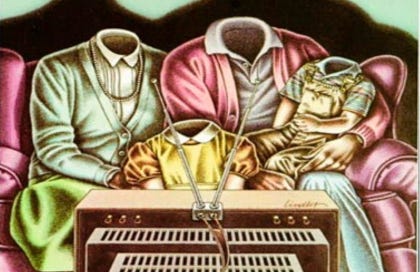First things first, you’ll notice things look different today.
That’s because I’ve switched my newsletter back to Substack (after leaving in 2023).
Here’s why I moved:
I want to get back to writing more in-depth essays
I want you to be able to read older essays
I want start publishing videos
I thought about launching a YouTube channel. Then Substack launched a video platform. So I thought, why not go back. Especially since I can publish my podcast here too.
What does that mean for you?
You’ll get weekly in-depth essays on managing ADHD (without meds). You’ll also get podcasts, videos, and the chance to comment on the posts I write.
Ok, housekeeping over. Onto today’s essay.
In 1948 George Orwell published Nineteen Eighty-Four.
A book about nation state control and surveillance. Orwell believed most of humanity would be controlled by dictatorial leaders (known as Big Brother) watching every move they make. And with this control, individual liberty is destroyed.
He wasn’t exactly wrong.
However, a book published 16 years earlier proved a more accurate prediction for how humanity is controlled today.
That book is Brave New World (1932) by Aldous Huxley.
Huxley new the state didn’t need to control humanity — he realised humans would medicate themselves into submission (via drugs and entertainment).
Later, in the 80s, Neil Postman wrote the classic media critique Amusing Ourselves to Death. Postman saw TV’s entertainment value as a present-day "soma", the pleasure drug in Brave New World, by means of which the citizens' rights are exchanged for consumers' entertainment.
Neil Postman died in 2003, but if alive today he’d see the vast majority of humanity lost to doomscrolling binges, addicted to celebrity culture, and unwittingly sacrificing their psychological liberty to the state without Big Brother lifting a finger.
This is tragic.
I’m not immune to this.
For the first quarter of this year I’ve struggled with doomscrolling, obsessing over what’s happening in politics, and even wasting entire day’s watching YouTube videos about subjects I can’t remotely remember.
Here’s how I fixed that.
How I reduced screen time by 45.5% in less than a week
When I finally stepped away from the relentless cycle of fast media, doomscrolling through Twitter feeds, compulsively checking the 24-hour news cycle, and losing myself in meaningless YouTube rabbit holes — something remarkable began to happen.
Life began to feel quieter. Not dull, not boring, but clearer, as if a fog had lifted. I could think deeply again. Conversations with friends and family improved significantly because my attention was fully present. My sleep quality drastically improved too, as the anxious thoughts previously fuelled by the latest news headline faded away.
Two tools made this transition possible: Opal and Focusmate.
Opal is an iOS app designed to help curb digital addiction.
It allows you to block distracting apps and websites for set periods of time. The brilliance of Opal is how it makes unblocking deliberately tedious; it gives you enough pause to reconsider your urge to open Twitter or Instagram impulsively. It's not magic, but it is powerful.
I set it to hardcore mode. So I literally cannot access the blocked apps unless I delete the app entirely.
Focusmate, on the other hand, is based on accountability.
It pairs you up for virtual "co-working" sessions with someone else equally committed to get shyt done.
You share what you’ll be working on, and for the next 50 minutes, you’re quietly working in tandem. It’s extremely effective. The presence of another person, even a stranger, is enough to destroys the temptation to doomscroll.
Now, here’s an essential point…
…Getting work done feels fantastic. This the magic of Focusmate. I’ve found myself enjoying admin. You won’t believe me until you try for yourself.
Anyway, that’s not all. I also had to get rid of my phone at night.
I get my phone away from me at night
I started leaving my phone in my office overnight.
That meant, upon waking, I couldn't instinctively reach out and immerse myself immediately in notifications, headlines, and updates. This created crucial breathing space in the mornings, a chance for my mind to wake gently, unaffected by outside chaos.
Instead of reaching for my phone, I started stepping outside early in the morning, exposing myself to natural daylight. The science behind this habit is robust: early morning light exposure stabilises your circadian rhythm, boosts serotonin levels, and naturally raises your mood. Research consistently demonstrates that regular morning sunlight significantly improves cognitive function, emotional stability, and overall mental health.
And that’s precisely what I experienced.
This simple habit of stepping outdoors first thing allowed my brain and body to reset, leaving me sharper and less vulnerable to digital distractions throughout the day.
Neil Postman warned us decades ago: we have willingly traded our mental freedom for entertainment disguised as convenience. My personal journey away from this cycle wasn’t easy, but the rewards were immediate and profound. I reclaimed time, clarity, and psychological freedom.
In short, by cutting down on digital distractions, I stopped amusing myself to death—and started living.





I’m falling into this trap again.
I was great with leaving my phone in the kitchen for a while but my one issue is that I love listening to Stephen Fry to sleep (especially after multiple mid-night wakes with kids) - its the only think that lulls my hyperactive brain into relaxation. I've tried a few different bluetooth speakers but none work as well as being able to control the sleep timer from the phone. I must give it a go again to see if the Apple watch controls have improved!